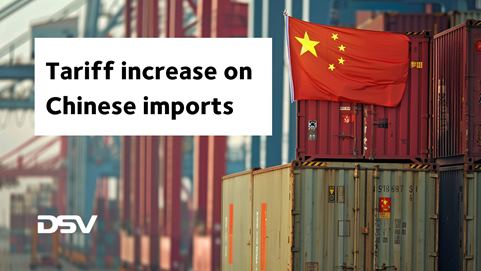US proposes tariff increase on Chinese imports
Following the four-year review of the China Section 301 tariff investigations, the United States Trade Representative (USTR) has decided to propose increasing tariffs on some Chinese imports.

Update published September 13, 2024
On September 13, 2024, the US Trade Representative announced the results of the expansion of section 301 duty on imports from China. With few changes, the majority of impacted articles will have additional duty start September 27, 2024. The others will have the increase phased in over the next few years.
In addition, the USTR will establish procedures for interested parties to request exclusions on some articles.
Please see Annex A in the USTR's announcement for rates and implementation dates.
Update Published July 31, 2024
On July 30, 2024, the USTR announced they are reviewing over 1,100 public comments on proposed changes to the China Section 301 actions and has postponed the implementation of August 1, 2024 to a later date to be advised.
Update Published June 4, 2024
On May 28, 2024, the USTR announced in the Federal Register that the comment period for their new proposal referenced below, will begin May 29,2024 and close on June 28, 2024. This announcement includes updating the section 301 additional China duty for certain articles, which are scheduled to take effect on August 1, 2024.
Published May 15, 2024
On May 14, 2024, the Office of the US Trade Representative (USTR) proposed modifications on select Chinese-origin products in various sectors, in accordance with Section 301 of the Trade Act of 1974. This move marks the conclusion of the USTR's obligatory four-year review, assessing the Section 301 tariffs previously enforced by the prior Administration on various Chinese products.
The proposed modifications are:
- Battery parts (non-lithium-ion batteries) increase rate to 25% in 2024
- Electric vehicles increase rate to 100% in 2024
- Facemasks increase rate to 25% in 2024
- Lithium-ion electrical vehicle batteries increase rate to 25% in 2024
- Lithium-ion non-electrical vehicle batteries increase rate to 25% in 2026
- Medical gloves increase rate to 25% in 2026
- Natural graphite increase rate to 25% in 2026
- Other critical minerals increase rate to 25% in 2024
- Permanent magnets increase rate to 25% in 2026
- Semiconductors increase rate to 50% in 2025
- Ship to shore cranes increase rate to 25% in 2024
- Solar cells (whether or not assembled into modules) increase rate to 50% in 2024
- Steel and aluminum products increase rate to 25% in 2024
- Syringes and needles increase rate to 50% in 2024
Additionally, the proposal recommends:
- Establishing an exclusion process targeting machinery used in domestic manufacturing, including proposals for 19 exclusions for certain solar manufacturing equipment.
- Allocating additional funds to United States Customs and Border Protection for greater enforcement of Section 301 actions.
- Greater collaboration and cooperation between private companies and government authorities to combat state-sponsored technology theft.
- Continuing to assess approaches to support diversification of supply chains to enhance our own supply chain resilience.
The USTR has issued a Federal Register notice announcing procedures for interested persons to comment on the proposed modifications and information concerning an exclusion process for machinery used in domestic manufacturing.
DSV remains committed to keeping you informed and assisting you in your business operations. Should you have any questions or concerns, please reach out to your local DSV representative or email us at customs.services@us.dsv.com.
Any questions?
Our experts are ready to help. Get in touch and we'll find the solution you need.

